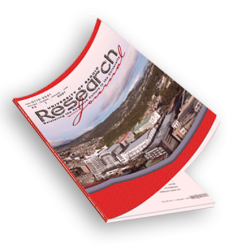UB RESEARCH JOURNAL
Safeguarding Academic Integrity
Predatory journals and publishers attract researchers with quick and easy publishing promises but care more about profit than quality. They often skip proper peer review, putting researchers’ reputations and work at risk.
What Are Predatory Journals and Publishers? Predatory journals are deceptive academic outlets that prioritize profit over scholarly integrity, often bypassing legitimate peer review, offering misleading metrics, and exploiting researchers through hidden publication fees and false promises of rapid dissemination (COPE, 2023).
Red flags to look out for:
- Unsolicited Invitations. Receiving frequent, aggressive emails inviting you to submit a paper, join the editorial board, or attend a conference.
- Promises of Fast Publication. Guarantees of very rapid peer review (e.g., acceptance within a few days or a week) without clear explanation of the review process.
- Lack of Rigorous Peer Review. Little to no information about peer-review procedures, or immediate acceptance of submissions without revisions.
- Fake or Misleading Impact Factors. Claims of high “impact factors” from unknown or non-credible sources (not Clarivate’s Journal Citation Reports or Scopus CiteScore).
- Editorial Board Irregularities. Editorial board members who are unqualified, nonexistent, or listed without their permission. Inability to verify the board members’ affiliations or expertise.
- Poor Website Quality. Numerous spelling, grammar, and formatting errors. Broken links, missing policies (such as retraction or ethics policies), or fake ISSNs.
- Hidden or Unclear Fees. Publication fees (Article Processing Charges) are not stated upfront or only revealed after acceptance.
- False Indexing Claims. Claiming to be indexed in reputable databases like Scopus, Web of Science, or DOAJ when they are not.
- Scope Creep. Accepting articles outside the journal’s stated scope, suggesting a lack of academic standards.
- Lack of Transparency. No clear physical address or real contact information. Vague or missing author rights and copyright policies.
Indicators of Predatory Conferences
a. The event is organized by a for-profit entity, rather than a credible scholarly or scientific society or association
b. The conference combines a number of fields topics or disciplines into a single conference.
c. The conference uses a free e-mail address, such as Gmail address.
d. The organizers spam prospective attendees to submit proposals and register.
e. Information about who is organizing the conference is either unclear or non-existent; or the organizer is not well known or reputable.
f. Acceptances are promised with a very short turnaround time (often less than four weeks).
g. The conference is marketed as a holiday in a desirable location. The event is held at a resort or a popular tourist destination and marketed as a holiday, rather than an academic or scientific event.
h. The conference name bears a striking resemblance to that of a credible or highly prestigious conference, but has a subtle minor differences in its name.
i. Organizers guarantee contribution will be published as an article in the journal associated with the conference. Like the conference, the journal is also predatory and the organizers may later insist on additional article processing charges to publish your article.
j. The conference websites are unstable. They may change URLs or have no record of conferences in previous years.
k. The website text contains poor grammar or numerous spelling errors.
l. Conference fees seem quite high, compared to those run by non-profit scholarly societies or associations.
Source: Eaton, S.E. (2018). Avoiding Predatory Journals and Questionable Conferences: A Resource Guide. Calgary, Canada: University of Calgary

Publication Ethics
All authors are expected to adhere to the highest standards of publication ethics, as prescribed by the Committee on Publication Ethics (COPE). Any form of academic misconduct, including but not limited to data fabrication or falsification, plagiarism (including self-plagiarism without appropriate acknowledgment), and the unauthorized use or misappropriation of another individual’s work, is deemed unacceptable. Allegations or instances of ethical violations shall be treated with the utmost seriousness and will be addressed in accordance with the established COPE guidelines to preserve the integrity and credibility of the scholarly record.
ORCID ID
The University of Baguio supports the use of Open Researcher and Contributor Identifier (ORCID) and mandates that the corresponding author provide an ORCID iD upon manuscript submission. We strongly encourage co-authors to register for ORCID and link their ORCID iDs to the submission. The ORCID iD of the corresponding author, along with those provided by co-authors, will be published.
SIMILARITY CHECK
Authors may also utilize the Turnitin Draft Coach to check their manuscript for similarity. This tool is available in Google Docs under the ‘Add-Ons’ tab. To access it, please log in using your UB Mail credentials. For more information
